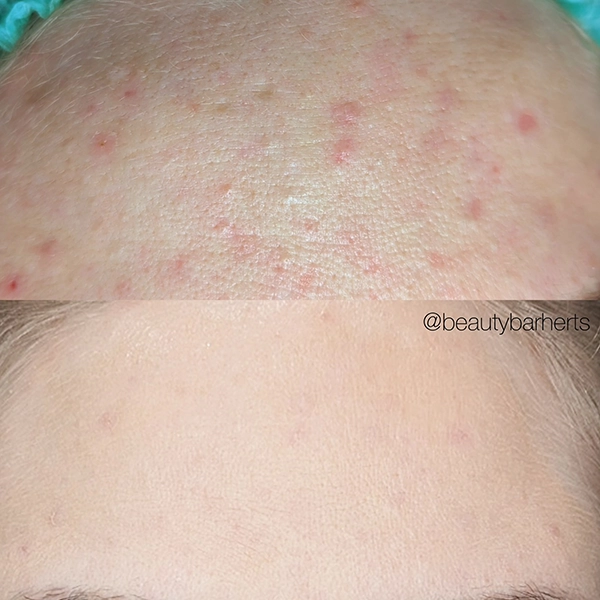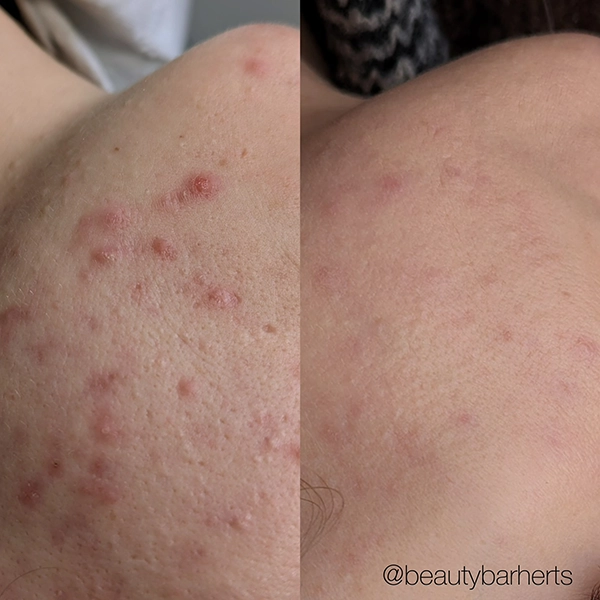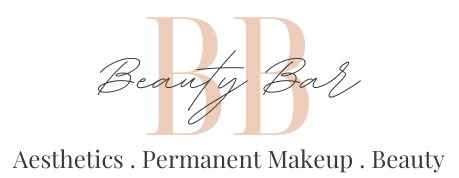Acne Treatments in Hertfordshire
Professional Acne treatments at Beauty Bar in Ware Hertfordshire
Acne, or acne vulgaris, is a common skin condition that affects the oil glands and hair follicles in the skin. It often causes a variety of lesions, including pimples, blackheads, whiteheads, cysts, and nodules, which typically appear on the face, neck, chest, back, and shoulders. We offer various treatments for acne breakouts, acne prevention, and acne scars. Contact us today to book your appointment.
What is acne?
What Causes Acne
Acne happens when hair follicles get clogged with oil (sebum), dead skin cells, and bacteria. A number of factors contribute to this, including hormonal changes, increased oil production, and inflammation caused by bacteria such as Propionibacterium acnes. Hormonal fluctuations, particularly during puberty, can increase oil production, leading to clogged pores and the formation of acne.
Other factors that may worsen acne include stress, certain medications, hormonal imbalances, a poor diet, and using unsuitable cosmetic products. While acne is often associated with teens, it can affect people of all ages.
Professional Acne Treatments
Professional acne treatments can reduce inflammation, prevent breakouts and scarring, and improve the overall look and health of your skin. Treatments, including chemical peels, microneedling, skincare routines, and lifestyle changes, can give long-lasting results, helping you get back your confidence and clear skin.


What can cause acne and how does it develop?
Reasons why you could be getting acne
Acne is a complex skin condition caused by a combination of factors.
Excess Sebum Production
One of the main causes of acne is the overproduction of sebum, an oily substance produced by the sebaceous glands. Hormonal fluctuations, especially increases in androgens like testosterone, can trigger these glands to produce too much oil. This excess sebum can easily clog pores, setting the stage for acne.
Abnormal Follicular Keratinization
In people prone to acne, dead skin cells don’t shed as they should. Instead, they build up inside hair follicles and mix with sebum, forming a plug. This plug is called a comedone, which can appear as an open comedone (blackhead) or a closed one (whitehead).
Bacterial Overgrowth
Propionibacterium acnes (P. acnes), a naturally occurring bacterium on the skin, plays a significant role in acne. When pores are clogged, it creates the perfect environment for P. acnes to multiply. These bacteria feed on trapped sebum and release substances that trigger inflammation.
Inflammation
As the immune system responds to clogged pores and bacterial growth, inflammation occurs. This leads to redness, swelling, and pain, which are typical of more severe acne lesions like cysts and nodules.
Genetic Factors
Genetics also play a role in acne development. If acne runs in your family, you’re more likely to develop it. Your genes can affect how much oil your skin produces, how your body responds to hormones, and how prone you are to inflammation.
Additional factors such as stress, hormonal imbalances, certain medications (like corticosteroids or lithium), diet (especially high-glycaemic foods), and environmental factors can further influence acne development.
Why Understanding Acne Matters
Understanding the different causes of acne can help in finding the right treatment. Whether it’s regulating oil production, reducing bacterial growth, or calming inflammation, a targeted approach can lead to clearer, healthier skin.
Professional acne treatments in our beauty salon in Ware Hertfordshire.
Chemical Peels
Chemical peels can deeply exfoliate the skin, unclog pores, and reduce acne breakouts. These treatments also help improve post-inflammatory hyperpigmentation and skin texture.
Microneedling (Collagen Induction Therapy)
Microneedling stimulates collagen and elastin production. It is very effective for improving acne scars and skin texture. It can boost the effectiveness of topical acne treatments.
Mesotherapy
Mesotherapy involves the injection of vitamins, minerals, and other active ingredients into the skin to improve hydration, reduce inflammation, and promote skin rejuvenation. It can support acne treatments by enhancing skin health.
Deep Phyto Peel
This peel uses plant-based ingredients to exfoliate and improve skin texture. These peels penetrate deeper into the skin for more effective exfoliation.
The effectiveness of these treatments can vary depending on your skin type, the severity of your acne, and your aftercare routine.
Different types of acne.
Comedones
Open Comedones (Blackheads): These appear as small, dark spots on the skin’s surface. The dark color is due to the oxidation of melanin, not dirt. Since the pore is open, the material inside is exposed to air, causing the color change.
Closed Comedones (Whiteheads): These are small, flesh-colored bumps that remain closed by a thin layer of skin. Unlike blackheads, they are not exposed to air, so they stay white or skin-toned.
Papules
Papules are small, raised, red or pink bumps on the skin. They do not contain pus and are often slightly inflamed, making them sensitive to touch. Papules usually develop when comedones become irritated, leading to inflammation.
Pustules
Pustules resemble papules but have a white or yellowish center filled with pus. This pus consists of bacteria, dead cells, and inflammatory fluids. Pustules are often red at the base and can feel tender or uncomfortable.
Nodules
Nodules are larger, hard bumps that develop deep under the skin. They are painful and typically more severe than papules or pustules. They often feel firm to the touch and can increase the risk of scarring if not treated properly.
Cysts
Cysts are large, soft, pus-filled lesions that resemble boils. They develop deep within the skin and are painful, often surrounded by significant redness and swelling. Cystic acne is the most severe type and is more likely to lead to permanent scarring.
All you need to know about acne
What Skincare Ingredients Can Help with Acne?
Skincare ingredients can help treat acne and improve your skin’s health.
Benzoyl Peroxide is a powerful antibacterial agent that targets Propionibacterium acnes, the bacteria responsible for acne. It also helps reduce excess oil production and has anti-inflammatory properties to calm redness and swelling.
Salicylic Acid this beta hydroxy acid (BHA) is known for its ability to exfoliate the skin and unclog pores. It dissolves excess oil and helps clear away dead skin cells, preventing the formation of blackheads and whiteheads.
Retinoids such as retinol are vitamin A derivatives. They work by regulating skin cell turnover, preventing clogged pores, and reducing inflammation. Retinoids can also help diminish acne scars and improve skin texture.
Azelaic Acid has antibacterial and anti-inflammatory properties. It regulates skin cell production, helping prevent clogged pores, and can also reduce redness and dark spots from post-acne hyperpigmentation.
Tea Tree Oil has antimicrobial and anti-inflammatory benefits. It helps fight acne-causing bacteria and can soothe inflamed skin, making it a good option for those looking for a more natural remedy.
Niacinamide (vitamin B3) is an anti-inflammatory that helps regulate oil production while improving the skin’s barrier function. It can also reduce the appearance of acne scars and pigmentation, making it ideal for soothing irritated skin.
Alpha Hydroxy Acids (AHAs) such as glycolic and lactic acid, gently exfoliate the skin and encourage cell turnover. They’re particularly effective for treating post-acne scars, improving skin texture, and brightening the overall complexion.
Prevent acne breakouts
Cleanse Your Skin
Use a mild cleanser to wash your face twice a day—morning and night. Avoid harsh scrubbing or using overly aggressive cleansers, as these can irritate the skin and potentially worsen acne. Remove excess oil, dirt, and makeup without stripping your skin.
Avoid Excess Oil and Dirt Buildup
Keep your hair clean and avoid letting it rest on your face, as oils and dirt from your hair can clog pores (especially if you have a fringe). Regularly wash pillowcases, hats, and phone screens that come into contact with your face to reduce bacteria and dirt buildup.
Don’t Pick or Squeeze Pimples
Squeezing or picking at acne spots can cause further inflammation, lead to infection, and increase the risk of scarring. Allow pimples to heal naturally or use a spot treatment.
Choose Non-Comedogenic Products
Go for non-comedogenic (non-pore-clogging) or oil-free skincare products, makeup, and sunscreen. These products are less likely to block pores and contribute to breakouts, helping maintain clearer skin.
Avoid Excessive Tanning
While some sun exposure may help dry out acne, too much can irritate the skin and worsen breakouts. Always wear a broad-spectrum sunscreen with SPF 30 or higher when outdoors. Sun protection helps prevent not only acne but also long-term skin damage and hyperpigmentation.
Healthy Diet
Some research suggests that diets high in refined sugars, dairy, and high-glycaemic foods may contribute to breakouts.
Visit a Dermatologist
If your acne is persistent or severe seek professional advice from a dermatologist who can recommend appropriate medications.
Each person’s skin is unique, and it might take some experimentation to find the routine that works best for you. Patience and consistency are key when it comes to preventing breakouts.
What supplements or vitamins can help with acne?
Omega-3 Fatty Acids
Omega-3s, found in fatty fish like salmon, mackerel, and sardines, have strong anti-inflammatory properties. These healthy fats may help reduce inflammation and improve acne in some people, especially when inflammation is a key factor in breakouts.
Zinc
Zinc is a mineral with antimicrobial and anti-inflammatory benefits for the skin. Some studies suggest that zinc supplementation, both oral and topical, may reduce acne severity by promoting wound healing and reducing bacterial growth.
Probiotics
Probiotics, the beneficial bacteria that support gut health, have been studied for their potential benefits in acne management. By improving the balance of gut flora, probiotics may reduce inflammation and improve acne symptoms.
Important Note: Supplements should not replace a healthy diet and proper skincare routine. Before starting any supplements for acne, always consult your doctor to make sure they are safe and appropriate for you.


Long term effects of acne and scar prevention.
Acne can have lasting effects, especially if left untreated or if the condition is severe.
Post-Inflammatory Hyperpigmentation (PIH)
refers to the dark spots or patches that can form after acne has healed. This happens when the skin overproduces melanin in response to inflammation. While PIH is temporary and usually fades over time, it can linger for months, particularly if the skin is not protected from the sun.
Acne Scarring
Severe acne can lead to permanent scarring, which may appear as depressed areas (atrophic scars) or raised, thickened areas (hypertrophic scars). Scarring occurs when the healing process disrupts collagen production, causing the skin to heal unevenly. Preventing scarring is easier than treating it, so early intervention is key.
How to Prevent Acne Scarring
Early and Effective Treatment
The best way to prevent scarring is to treat acne early and effectively.
Avoid Picking or Squeezing
Picking or squeezing acne lesions can worsen inflammation and lead to skin trauma, increasing the risk of scarring. Resist the urge to touch or manipulate breakouts to help your skin heal properly.
Sun Protection
Tanning can worsen both acne scars and post-inflammatory hyperpigmentation. Use a broad-spectrum sunscreen with SPF 30 or higher every day, even in cloudy weather.
Skincare Routine
Use mild, non-comedogenic cleansers. Avoid harsh scrubs or abrasive exfoliants that can irritate the skin.
Professional Treatments for Scarring
If scarring does happen, professional treatments like chemical peels, microneedling, or mesotherapy can help improve the skin’s texture and reduce the appearance of scars.


Effective acne treatments at Beauty Bar in Hertfordshire
If you’re looking for expert acne treatments in Hertfordshire, we provide effective skincare solutions and professional salon treatments in Ware and surrounding areas like Hertford, Hoddesdon, Cheshunt, Hatfield, Welwyn Garden City, Stevenage and Broxbourne. Get in touch today to start your journey to clearer, healthier skin!
Book your acne treatment in Ware Hertfordshire today!
Acne solutions at Beauty Bar in Ware Hertfordshire.
Contact us and take your first step by booking your acne treatment.
